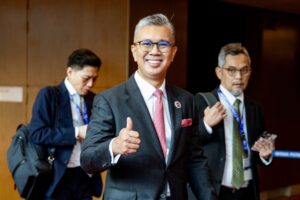KUALA LUMPUR, Sept 11 — Malaysian binational families have pushed back against a deputy minister’s claim that foreigners marry locals to run businesses, stressing that their marriages are rooted in family life, not profit-making.
Family Frontiers, an advocacy group for Malaysian binational families’ rights, was responding to Deputy Domestic Trade and Cost of Living Minister Datuk Fuziah Salleh, who told the Dewan Negara last week that marrying Malaysians was a “modus operandi” for foreigners to operate businesses legally.
The group said non-citizen spouses already face major barriers to employment due to immigration rules.
“In our current reality, the struggle to earn a living as a spouse is significant due to restrictive regulations. Without the necessary work endorsements in our passports, we are treated similarly to any other foreigner, severely limiting our ability to work and earn an income,” a foreigner who gave his name as Aaron and who runs a family business with his Malaysian wife, said in a statement through Family Frontiers.
The group noted that last year, 158,708 non-citizen spouses were issued Long-Term Social Visit Passes, most of which carry the phrase “Any Form of Employment is Strictly Prohibited.”
The group added that its own survey in 2021 found more than 70 per cent of non-citizen spouses held at least a bachelor’s degree, but 77.2 per cent struggled to find work and 34.2 per cent said employers were “very unwilling” to hire them after seeing the visa restriction.
The group said proposals to restrict business registration for five years after marriage were “deeply misguided” and would unfairly punish legitimate families.
It urged the government to remove the employment prohibition on the LTSVP and dismantle barriers to work, saying spouses contribute to Malaysia’s economy and deserve the chance to support their families with dignity.
“Both then and today, non-citizen spouses have yearned to make Malaysia their home, so as to not uproot their Malaysian families.
“Yet, as perpetual outsiders, they face challenges in almost every aspect of everyday life – from employment to education to healthcare to financial services and transport.
“Precarious immigration statuses set the basis for systemic discrimination,” another foreigner married to a Malaysian who gave her name as Gulzhan, said in a statement through Family Frontiers.
On September 3, Fuziah told the Senate that some foreigners marry Malaysians to register businesses under their spouses’ names, since the law only allows citizens and permanent residents to do so.
She said local traders have complained about this practice, which they view as a threat, although such registrations remain legal.






